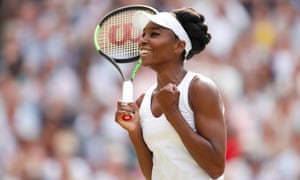At 3pm next Saturday the world’s first and only vegan football club will make sporting history when they play in the Football League for the first time. Forest Green Rovers, who were founded in the 19th century by a man named Peach, and play in green at the appropriately named New Lawn, take on Barnet – the Bees – in their first fixture in League Two. They will use their new status to spread the message of veganism around the sporting world.
“We’re having a big impact because we’re counterintuitive,” said Dale Vince, the multimillionaire who owns the club, the green energy company Ecotricity, and is a big donor to the Labour party. “Spreading the vegan word through the world of football – what could be more counterintuitive than that?”
Vince, who ensures that only plant-based food is available to players and spectators at the stadium in Nailsworth, Gloucestershire, is not alone. Famous athletes in a wide range of sports are forsaking meat and appear to be having a big impact on the number of people trying a plant-based diet.
Some of the world’s leading footballers, including Barcelona’s Lionel Messi and Manchester City’s Sergio Agüero, do not eat meat during the playing season, while England striker Jermaine Defoe has gone a big step further by taking up a vegan diet. Wimbledon finalist Venus Williams, an Italian rugby international, a US Olympic weightlifter, a number of hulking American football players, former heavyweight world champion David Haye, two snooker world champions and several top Australian cricketers are also on the vegan list.
Other sports with top-level vegans are wrestling, surfing, cycling, ice hockey, parkour – the “extreme gymnastics” sport that may be added to the Olympic programme – squash, bobsleigh, mixed martial arts fighting and ultra-running.
The surge had come in recent years, driven by digital media, said Vince. “It’s a mixture of people looking for an edge to improve performance, greater prevalence of knowledge, and more scientific evidence about the benefits, not just in sports performance but for human health,” he said.
While Vince and the Vegan Society welcome the new wave of plant-powered sports stars, others are less happy because many are giving up meat for personal performance benefits, not because they are in tune with the vegan lifestyle and compassion for animals.
But Dominika Piasecka, media officer for the Vegan Society, welcomed the sporting newcomers and predicted there would be more. The sports stars’ influence “has definitely helped to further the cause of veganism,” she said. “People really do take notice, especially if they’re a fan of the person.”
The England-based Vegan Society, founded in 1944 when the movement began, is overseeing “the fastest-growing lifestyle movement of the 21st century”. Its researchers put the number of vegans in Britain at 542,000 – up 260% in 10 years – and estimate that about 1% of the population in Britain, Germany and the US is vegan. “It is very likely that we will see an increase in the number of vegan sportspeople because more of them are starting to realise the benefits of a vegan diet,” Piasecka said. Forest Green Rovers are “breaking stereotypes and helping people to associate veganism with health, fitness and wellbeing”.
Myths about the need to eat meat for protein have long since been disproved.
An aristocratic real tennis player who won a silver medal at the London 1908 Olympic Games was an early promoter of vegetarianism in Britain. Eustace Miles, a philanthropist, wrote Health Without Meat, which was a bestseller for years after it was published in 1915.

A few years later Paavo Nurmi, the Finn who was a vegetarian from boyhood, would establish himself as the greatest middle- and long-distance runner of the20th century. He won nine Olympic golds.
The Australian swimmer Murray Rose, nicknamed “the seaweed streak” because he ate a lot of seaweed in his vegan diet, was 17 when he won three Olympic golds in 1956.
In the television age Ed Moses, unbeaten for eight years at the 400m hurdles, and 100m world record holder Leroy Burrell were vegetarian, and the biggest name by far to adopt a vegan diet was Carl Lewis, the world’s most famous sprinter before the chicken-nugget lover Usain Bolt came along. The notorious boxer Mike Tyson also adopted a plant-based diet after he quit the ring.
But Lewis and Tyson stuck with it only for a few years and others may follow suit when their competing days are over.
Forest Green’s “vegan club” label is not what it seems. The players are not vegan, they simply have to eat plant-based meals at matches and training. No animal products are on sale at the stadium. “We don’t check up on them away from the club but we hear that players are changing their approach [to their diet], and it happens with fans too,” said Vince. “Just doing these things and talking about it has an effect on everybody – players, fans, even the media.”
Venus Williams is widely seen, even by herself, as a “cheagan”, a cheating vegan who does not stick strictly to the lifestyle. A blogger on the ecorazzi website criticised Haye for using veganism as “nothing but a vessel for self-promotion and adulation. For the sake of the animals … we should pay no attention, nor give any credence to the positions of these athletes who are interested in nothing but their own careers”.
But Vince believes this criticism is misguided. “It’s a mistake to be too purist about it. What we want to do is get the interest of the general public, we want them to know that a plant-based diet is easily available to them. It has to be accessible. Absolutely, these sportspeople can help.”
Jason Gillespie, one of Australian cricket’s great bowlers until he retired in 2006, became a vegan during his highly successful five-year stint as coach of Yorkshire. Gillespie, who buys clothes in charity shops to support recycling, caused a stir when he suggested that a way should be found of making cricket balls without using leather, and when he questioned Yorkshire’s need to have a dairy company as a main sponsor. “Hopefully one day the dairy industry can be shut down,” he said at the time.

Gillespie is far more committed than most of the big-name vegans in sport, but he agrees with Vince. “People who choose the vegan lifestyle on compassionate grounds will more likely stay with it as opposed to people who choose to eat vegan purely for performance or as a diet,” Gillespie said from his home in Adelaide. “I have no problem with athletes eating vegan purely for performance. If the vegan message is getting out there then that is a step in the right direction.
“There is more awareness about veganism these days compared to when I was playing. I believe the vegan food industry is going to really expand in the next five years. It’s very exciting.”
Brenda Carey, owner and editor of Vegan Health and Fitness magazine in the US, is more wary than welcoming. “As an idealist, I wish that everyone would choose to eat vegan to relieve the suffering of animals. I also wish that everyone would care enough about the environment to want to avoid animal products as the number one cause of environmental destruction on the planet.
“There are many top vegan athletes who are vegan for these reasons – and yes, they get a performance boost. However, there are many high-profile vegan athletes who never mention anything but their personal, selfish benefits from avoiding animal products and eating more plants. We call those people ‘plant-based’ as they do not embrace a full vegan lifestyle, they just eat plants.
“I get concerned about the people who simply follow this behaviour because their favourite athlete or celebrity has done so. Unfortunately people who choose to ‘go vegan’, which often equates to merely eating plant-based, for selfish reasons such as performance benefits or weight loss, tend to be the ones who fall off the wagon and go back to eating animal products later.”
Carey is, though, a realist as well as an idealist, “so I’m just glad when anyone chooses to avoid eating animal products”.
The strongest sporting voice against uncommitted plant-eaters is Neil Robinson, who became the first vegan footballer in Britain, and, he thinks, the world. He played for Everton, Swansea and others in a 16-year career from 1974, and says football is still “in the stone age” for vegans. He is critical of “cheagans” and fad dieters.
“To a small degree I get what Dale [Vince] thinks but, I am a purist. I’m always sceptical when I hear that a sportsperson or celebrity has become ‘plant-based’ for health reasons. It dilutes veganism into being just a diet when in fact veganism is an ethos, a lifestyle of non-violence and compassion towards all living creatures.
“Football is still in the stone age when it comes to embracing veganism. Clubs these days employ ‘qualified’ nutritionists and it baffles me as to how these so-called experts can ignore the fact that animal foods are totally unnecessary for human health and, most importantly as far as they’re concerned, sporting performance. Individual sportsmen and women are now ‘getting it’ but the clubs and authorities, with the exception of Forest Green Rovers, appear to be aeons away from embracing the plant food age.”
Perhaps the best role model for plant-powered health is Fauja Singh, the 106-year-old runner who appeared alongside David Beckham in an advertising campaign and who ran the London marathon aged 101. He turned vegetarian in his 80s and eats mostly rotis, lentils, spinach and ginger. He takes only small portions and said:, “If you ask me, more people die from overeating than starvation.”
But when he wants a treat he goes to a place no vegan would ever visit – McDonalds, for a milkshake. A small one, of course.



